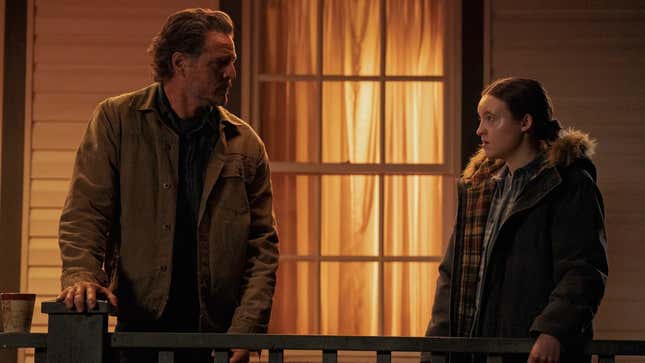
The Last of Us season two’s penultimate episode was almost entirely flashbacks of Joel and Ellie’s lives together in Jackson. Some of these were plucked straight from the Last of Us Part II video game, others are brand new for the series. The most important one, however, was Joel and Ellie’s final conversation on his back porch. If you’ve never played the games (and remember, the TV show is spreading the story of the second game across three seasons, of which we’ve just finished the first third), you might not know this scene was originally withheld from players until the very end of the game, meaning viewers are seeing it drastically earlier.So why did the show make such a huge change? According to series director Neil Druckmann, the show’s crew thought it “wouldn’t work” to deny viewers that moment for years. To which I say: That’s coward shit.
Druckmann talked about the scene alongside showrunner Craig Mazin and Part II narrative lead Halley Gross on the latest episode of the Last of Us podcast. The weekly show gives fans a behind-the-scenes look at the making of each episode, and this week Druckmann explains how nervous he was about recreating the scene for the show. Because, he says, it’s “the most important scene in the entire story.” Yeah, it’s the Rosetta Stone through which we interpret everything that happens in The Last of Us Part II, so the show needed to get it right. (I’d argue they butchered it by making Pedro Pascal clarify and explain everything his character is feeling in an exhaustive fashion, but I digress.)
This scene is kept until the very end of The Last of Us Part II because it’s meant to recontextualize everything that’s come before. The player is walled off from the full scope of Ellie’s motivations as she undergoes a violent transformation. Gradually finding out through flashbacks that her and Joel’s relationship had deteriorated over the years to the point of her going no-contact with him is a core part of the game’s narrative structure—but none of it comfortably explained her destructive spiral. It was previously left unclear for the player for most of the story. So, latterly finding out she carried out her vendetta because she had lost an opportunity to reconcile with Joel, just as she was opening up to the idea, is a heartbreaking reveal. We finally learn what tipped her over the edge at the very end. Now, the show has revealed this before the story is even halfway over. Some (me) might argue this fundamentally undermines the narrative tension of the story, so why move it? Here’s what Druckmann has to say with more context:
“That porch scene, I was so nervous about that because again, that scene is to me the most important scene in the entire story,” he said. “Which is why, in the game, it’s at the very end. One of the choices that we made to bring it up, and the reason we brought it up, is because we were worried it wouldn’t work if you had to wait years to get this pay-off. And it felt here, as we’re on this journey with Ellie, it felt appropriate to do it in this moment in time.”
It is a microcosm of the biggest issue with the season, for me. The constant expositional dumps, the lack of subtext in the writing, and the shifting around every reveal to ensure all viewers are quickly on the same page probably makes some feel more comfortable. But I contend it is fundamentally cutting the story off at the knees, seemingly because they didn’t want to force viewers into that same disconnect the games thrive in. If game players could barely stand that dissonance for 20-plus hours of a video game, they worry, how could viewers bear it for years between seasons? I’d argue that years of dissonance should have been the consequence of adapting the game into multiple seasons, rather than treating the original material’s structure—which was core to how the story was written—as an inconvenience needing to be written around. But as I’ve said in my recaps, this show seems hellbent on removing every divisive thorn from the source material, and the result is a far less bold and thought-provoking take on Ellie and Abby’s revenge tours.
If HBO is extending this story into three seasons, we’re not even halfway through this adaptation, and we already know pretty much every twist and turn because it was thought the original structure “wouldn’t work.” The Last of Us Part II was divisive, but it was unflinching. The show just continues to pull its punches and offer nothing in their place. This isn’t just a simple critique of HBO not doing things exactly the way they were in the game; it’s that it seems these decisions have been made without considering how it could unravel a story that was very deliberate in how it was told.
Anyway, we’ve got one episode left until the season’s over, and fans are already bracing themselves for what’s to come after seeing the finale’s preview.